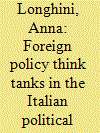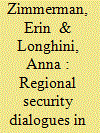| Srl | Item |
| 1 |
ID:
142221


|
|
|
|
|
| Summary/Abstract |
This paper explores the current state of foreign policy think tanks in Italy through an in-depth analysis of its main protagonists. These actors are not always immediately recognizable because the sector is not regulated and little data is publicly accessible. Empirically, the analysis is conducted through a web survey, in-person interviews, and a reputational analysis of seven organizations. This work not only identifies who these actors are and what they do, but it does so taking into account the political context. Such an institutional argument suggests that foreign policy think tank ties to the Italian political system are essential. At the same time, those ties pose serious limitations for the evolution of these organizations, especially in a transnational perspective.
|
|
|
|
|
|
|
|
|
|
|
|
|
|
|
|
| 2 |
ID:
181133


|
|
|
|
|
| Summary/Abstract |
The term regional security dialogue brings to mind state-organised conferences and events; however, an under-appreciated subset of such dialogues are organised by non-state actors that have unique formal aspects. These quasi-formal dialogues operate alongside, and sometimes in competition to, state-sanctioned processes. Why do some of these forums appear to be more effective at fostering regional dialogue than strictly formal or informal processes with the same goals? Drawing from heterogenous discourse approaches, we address this question by identifying and expanding the concept of the quality of discursive space, as a key feature for the success of security dialogues. We then apply this concept to two of the most successful so-called Track 1.5 security dialogues: the Munich Security Conference (MSC) in Europe and the Shangri-La Dialogue (SLD) in Asia. We analyse these cases using a mix of interviews with participants and organisers, participant observation, and public outputs with the aim of improving the understanding of the role and impact of Track 1.5 diplomacy in the practice of international security. Our findings highlight that it is what we call the quality of discursive space, as a mix of different components in this space, which differentiates effective dialogues from mere policy ‘talk shops’.
|
|
|
|
|
|
|
|
|
|
|
|
|
|
|
|